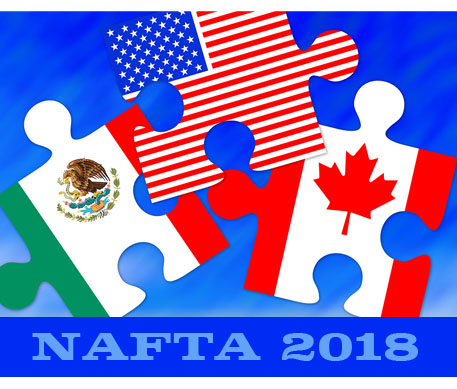OPINION
NAFTA 2018: Devil’s in the unknown details
By LYNNE DODSON
(Oct. 2, 2018) — A new NAFTA?
We woke up Monday to hear that a new NAFTA has been negotiated; that all the United States, Mexico, and Canada are in; and that this new trade agreement will be good for workers.
 Too soon to tell. According to AFL-CIO Trade Policy Specialist Celeste Drake, AFL-CIO President Richard Trumka, the USW, and the Teamsters International, there are too few details are in the text they reviewed to know whether or not the new trade deal will create good, high-wage jobs, protect the environment, and safeguard democracy. The text they received was incomplete — in draft form, important items unresolved, and no text around important issues like government procurement schedules.
Too soon to tell. According to AFL-CIO Trade Policy Specialist Celeste Drake, AFL-CIO President Richard Trumka, the USW, and the Teamsters International, there are too few details are in the text they reviewed to know whether or not the new trade deal will create good, high-wage jobs, protect the environment, and safeguard democracy. The text they received was incomplete — in draft form, important items unresolved, and no text around important issues like government procurement schedules.
The Washington Fair Trade Coalition released a white paper recently, calling on Congress to set clear, enforceable standards for new trade agreements that will raise the standard of living in the U.S. and in our trading partners’ nations. If the new NAFTA tweaks the edges and includes fine language, but no mechanism for monitoring or enforcement, it will just be more of the same. It will be yet another variation on a theme of trade deals that build the power and resources of multinational corporations and investors without improving the economy or making the lives of working people better.
The new agreement has improved labor rules, according to the AFL-CIO’s Drake. However, it is not clear how, or whether, the new rules will be monitored and enforced. It is also not clear whether or not Buy American policies will be strengthened or weakened.
The new NAFTA is worse in a lot of areas that matter to working people. Worse language on regulatory practices, financial services, affordable medicine, and privacy of personal data will provide new tools for Wall Street at the expense of workers and retirees.
The special access that multinational corporations have to a separate extra-judicial system– the investor-state dispute settlement or ISDS — has been partially reformed, but not enough.
“NAFTA 2018 would eliminate ISDS with Canada after three years (if they remain a party to the agreement),” Drake reports. She adds:
“For bilateral investment between the U.S. and Mexico, all investors would be able to access a pared down ISDS after exhausting local remedies and only on the basis of national treatment, most favored nation treatment, and direct expropriation. These are all improvements over the status quo. Full ISDS was retained for investors that have federal government contracts in the fields of oil, gas, power generation, telecommunications, transportation, roads, rail, canals, bridges, and dams, with investors in these sectors being eligible for access to the full suite of ISDS claims, including for alleged violations of the vague and ill-defined ‘minimum standard of treatment.’ These provisions continue to stratify access to justice, providing investors with special rights that are unavailable to working families. While restricted in NAFTA 2018, so long as any ISDS provisions are included in NAFTA, ISDS will continue to incentivize outsourcing, privilege foreign investors over local businesses, and ensure that gains of trade are not distributed equitably.”
That we still have too little information about the new NAFTA deal is another indication of the lack of transparency that continues to surround trade policy. Announcements that this is a “great deal” fall flat when the full text is not available for review and analysis by those most affected. While the AFL-CIO notes that U.S. Trade Representative Robert Lighthizer has incorporated some of labor’s advice, that is not the same as having a seat at the table while our futures are being debated and discussed.
The renegotiation of NAFTA gave an opportunity for our status-quo free trade deals to reset. It was, and still could be, a chance to rewrite the rules so that trade agreements raise the standard of living. There is too little detail in the new NAFTA to know whether or not that opportunity was taken.
 Lynne Dodson is Secretary Treasurer of the Washington State Labor Council, AFL-CIO. She also serves on the Board of the Washington Fair Trade Coalition.
Lynne Dodson is Secretary Treasurer of the Washington State Labor Council, AFL-CIO. She also serves on the Board of the Washington Fair Trade Coalition.





